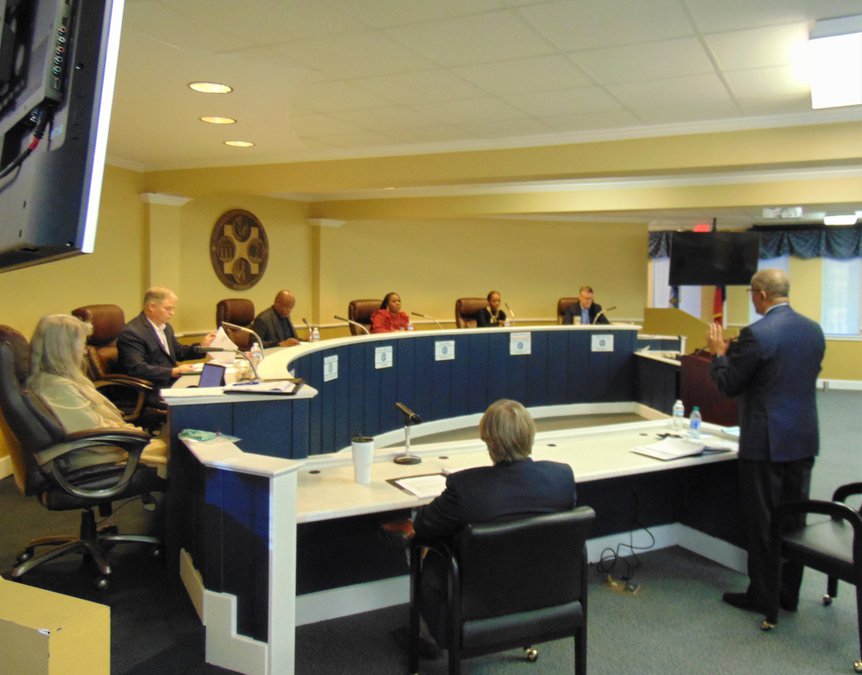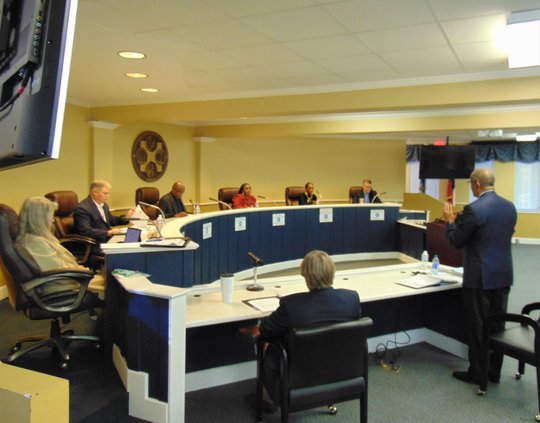Backed by a unanimous vote of Statesboro City Council, Mayor Jonathan McCollar replaced his March 22 COVID-19 executive order with a new one Tuesday that simply reflects Gov. Brian Kemp’s April 2 shelter-in-place order and allows Statesboro officials to enforce it.
The March 22 Statesboro order was not called a “shelter in place,” and it did not tell people to stay home. But as the mayor noted Tuesday, his executive order had included other provisions similar to those in the statewide order Kemp issued last week.
“The governor issued a shelter-in-place order that looked very much like what the city of Statesboro was already doing, so I do want to give the staff kudos on making sure that we did the right thing at the right time,” McCollar said.
He did not elaborate in his comments. But without using the terms “essential services” or “critical infrastructure” that are now in the governor’s order, the mayor’s previous order had prohibited most gatherings of more than 10 people, required bars, barbershops, salons, gyms and similar businesses to close and limited Statesboro’s restaurants to curbside, takeout, delivery and drive-thru service.
The mayor’s March 22 order followed his March 19 state of emergency declaration. Originally, the mayor’s emergency declaration ran for 30 days, but his executive order lasted only until noon Tuesday, when it would have expired.
“What … I would like to recommend to the council is that we take our state of emergency and coincide it with the state of Georgia’s, so that when the state of Georgia’s runs out, ours runs out at the same time,” McCollar said.
EGRMC treats 5
During the brief discussion shortly after 9 a.m. Tuesday, District 1 Councilman Phil McCollar asked, “What’s the status of our hospital?” referring to East Georgia Regional Medical Center.
“The whole point of us shutting everything down is so we don’t overwhelm the hospital, so I’d like to kind of know what the status of the hospital is, you know, are they in good shape, are our measures doing what they need?” Boyum said.
City Manager Charles Penny answered that he is in constant contact with Stephen Pennington, CEO of East Georgia Regional Medical Center.
“The last time I checked with them, which was maybe Friday of last week, they’re holding their own,” Penny said. “And I say that in this sense: There’s capacity there, but we want to be careful, because one day they may be OK, and then all of a sudden, they get overrun.”
Penny noted that EGRMC has been handling cases from Bulloch County “and some surrounding counties” and said that Pennington had been “cautiously optimistic about their numbers.”
Later Tuesday, Ted Wynn, director of the Bulloch County Emergency Management Agency, stated in his daily situation report that EGRMC was caring for five Covid-19 positive patients. Since the reporting began, 10 cases have been confirmed among Bulloch County residents.
Same as Kemp’s
When McCollar asked for a vote from council members Tuesday “to align our state of emergency with that of the state of Georgia,” District 4 Councilman John Riggs made the motion. District 3 Councilwoman Venus Mack seconded, and the vote was 5-0.
Later in the meeting, McCollar said he was issuing a new executive order that would be “the exact same order as (Gov. Kemp’s),” which could be found on the governor’s website.
“What this executive order is allowing us to do is to bring us all the way up to what the state of Georgia is doing, and it empowers our local police department, code enforcement, fire department and so forth to be able to enforce what the governor has already passed,” McCollar said.
Before the mayor signed his new order, City Attorney Cain Smith revised one time and date reference, making the order’s expiration time 11:59 p.m. Monday, April 13.
“Council, I believe it is a best practice to align what we do with what the governor does,” McCollar said.
After the meeting, Smith said the council’s vote gave the mayor “the green light” to “execute further orders that are in compliance with state issues.”
City couldn’t enforce
Kemp’s shelter-in-place command overruled local emergency orders except to the extent they track with the state order. The reason for Tuesday’s city action, as Smith explained further, was to allow Statesboro officials to enforce that order.
“Governor Kemp’s order allowed state agencies to enforce it, and a subsequent order allowed sheriff’s departments to enforce the order, but as it stood, our (city) authorities couldn’t enforce the governor’s order unless we did our own order allowing enforcement under the exact same parameters,” Smith said.
So now the city’s officers can enforce the shelter-in-place order, but they apparently lacked that power from the time Kemp’s order took effect Friday evening until council met Tuesday morning. During that time, the order would have been up to state officers such as those of the Georgia State Patrol to enforce in the city limits, Smith said.
Now Statesboro police can issue citations for violating the order. The ordinance requires that a warning be issued first, Smith noted, but a further violation would be a misdemeanor punishable by fines up to $1,000 and jail time up to one year.
Met in person
The mayor and the five-member council acted on several other matters Tuesday. All six elected officials attended Tuesday’s meeting in-person. They sat with a little extra space between them along the dais, and Penny sat facing them to allow this.
Only 10 widely space audience chairs were provided, and fewer residents and reporters attended. The city had the meeting livestreamed on its Facebook page and YouTube channel.
Penny announced that City Hall and the city’s other buildings will remain closed to the public through April 30 unless the pandemic abates.

